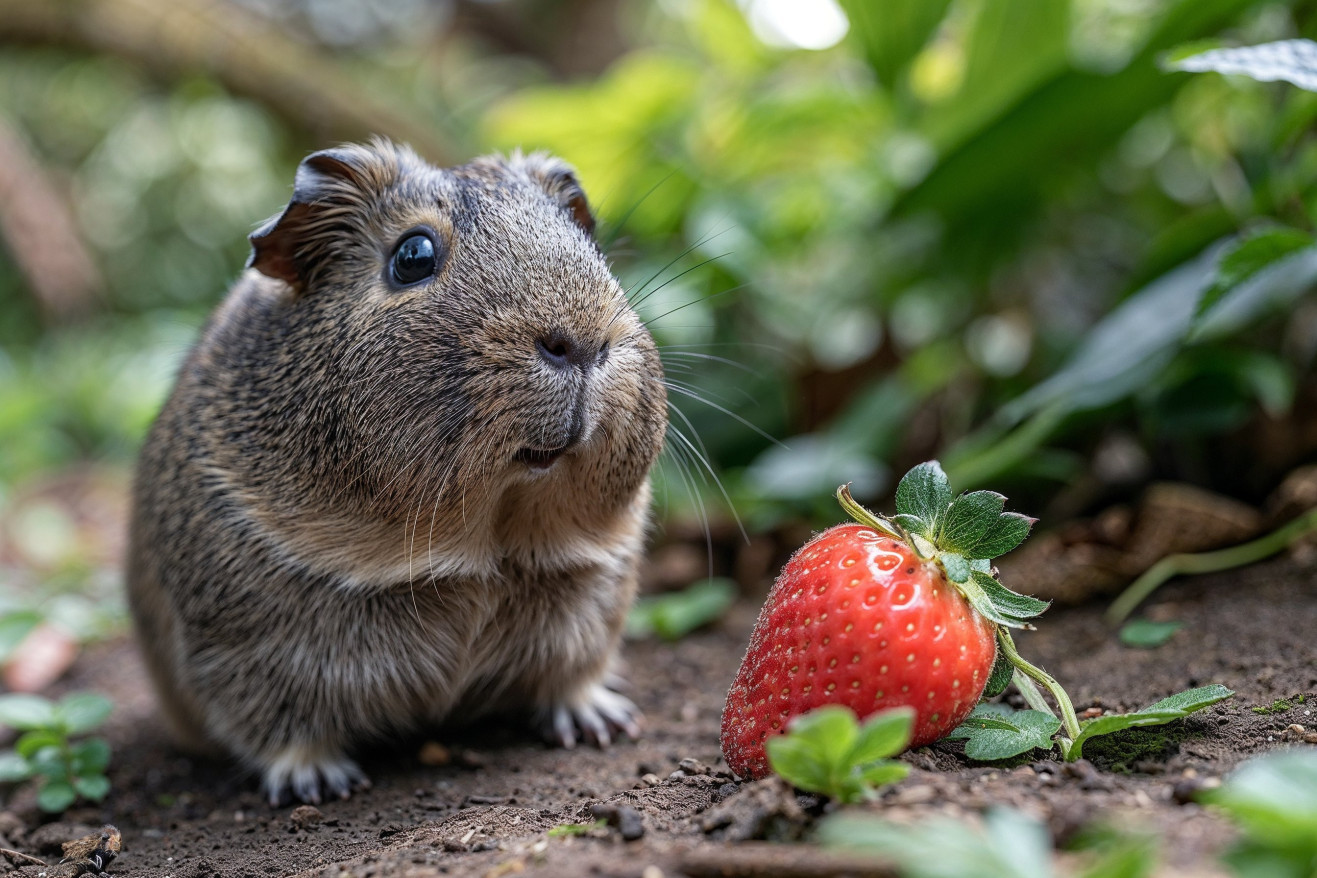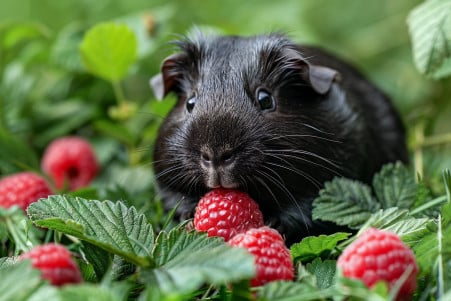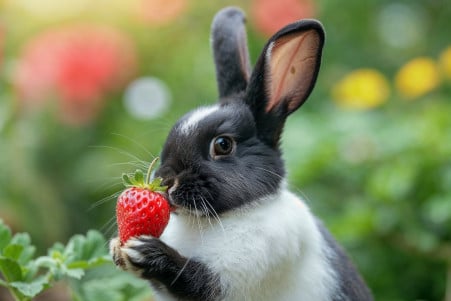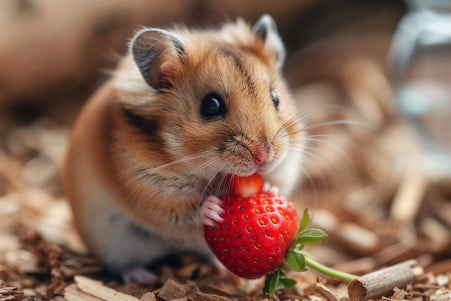Can Guinea Pigs Eat Strawberries? Safe Serving Sizes and Tips
20 January 2024 • Updated 28 January 2024

Strawberries are a delicious fruit that you may want to share with your guinea pig, but are they a good choice? They are! Guinea pigs can eat strawberries, but only in moderation. You can give them a small piece a couple of times a week, but make sure the strawberries are washed and free of pesticides.
While the high vitamin C levels in strawberries are good for guinea pigs, the sugar levels mean you should be careful about how much you give them.
In the course of this article, we will take a deep dive into veterinary opinions and nutritional research to better understand the place of strawberries in a guinea pig’s diet. We will look at studies that discuss the importance of vitamin C, the impact of sugar, and the right amount of strawberries to feed your guinea pig.
After reading these research-based insights, you will have the information you need to decide if you want to give your guinea pig this special treat.
Can guinea pigs eat strawberries?
The Berry Basics: Can Guinea Pigs Eat Strawberries?
Strawberries are not only known for their bright red color and sweet taste, but they also have a nutritional makeup that can be good for your guinea pig. Strawberries are high in vitamin C, fiber, and a variety of antioxidants, all of which are important for a guinea pig’s diet.
As Healthline explains, strawberries are especially high in vitamin C, which is important for guinea pigs because they, like humans, can’t make their own vitamin C. The fiber in strawberries is good for digestion, and the antioxidants are good for a guinea pig’s overall health.
Guinea pigs need a diet that’s high in vitamins, minerals, and fiber to avoid health problems like scurvy and digestive issues, according to the PDSA.
Fresh greens that are high in vitamin C should make up the majority of a guinea pig’s diet. Strawberries can be added to the diet as a treat to provide some variety and extra vitamin C.
However, strawberries should never replace the main components of a guinea pig’s diet, which include hay, fresh grass, and specially formulated guinea pig pellets, according to the RSPCA. The key is to strike a balance—offering a guinea pig a diet that’s well-rounded with the occasional treat like strawberries will help ensure it stays healthy.
Everything in Moderation: How Many Strawberries Can Guinea Pigs Have?
Like with any treat, it’s important to practice moderation when feeding your guinea pig strawberries. According to Guinea Piggles, the recommended serving size is a small piece that’s about the size of a mouthful for a human, or about a quarter of a large strawberry.
The Spruce Pets recommends feeding this to your guinea pig no more than a couple of times a week to avoid digestive problems, which falls in line with the general rule that fruit should make up no more than 2% of a guinea pig’s diet.
The potential side effects of feeding your guinea pig too many strawberries include diarrhea and obesity due to their sugar content, which is about 5%. You should introduce strawberries to your guinea pig slowly, starting with a small piece so you can see how your pet responds. If you notice any changes in your pet’s behavior or stool, you should contact your vet.
To make sure that you can feed your guinea pig strawberries safely, start with a small piece that’s about the size of a mouthful, especially for baby guinea pigs, and go from there. This will help you make sure that you’re adding to their diet without causing any harm, setting the stage for a conversation about the importance of vitamin C in guinea pig nutrition.
Why Vitamin C Is So Important for Guinea Pigs
Since guinea pigs can’t make their own vitamin C, they need to get it from their diet. Supreme Petfoods explains that vitamin C is important for the production of collagen, which is necessary for healthy skin, joints, and gums, as well as for proper wound healing and immune system function.
A lack of vitamin C can result in scurvy, which causes symptoms like rough hair, skin and gum sores, and a lack of movement due to joint pain.
Strawberries, which the Mariposa Veterinary Wellness Center notes are high in vitamin C, can help guinea pigs meet their daily vitamin C requirement of 10–30 mg per kilogram of body weight, according to The Spruce Pets.
However, it’s important to make sure that guinea pigs are getting a well-rounded diet that includes other vitamin C–rich foods like kale, parsley, and bell peppers in addition to strawberries to avoid feeding them the same thing every day. This will ensure that guinea pigs get all the nutrients they need while also keeping their diet interesting and tasty.
Potential Downsides: Strawberries and Guinea Pig Health
Despite the potential health benefits of strawberries, there are also some downsides to consider when feeding them to guinea pigs. The most obvious downside is that strawberries are high in natural sugars, which can contribute to obesity and diabetes, two conditions that guinea pigs are already at risk for due to their inability to synthesize vitamin C.
As Oxbow Animal Health explains, guinea pigs are concentrate selectors, meaning they are naturally drawn to energy-dense foods, so it’s important to limit their intake of sugary treats like strawberries.
Another downside is that strawberries can contribute to dental problems. The Unusual Pet Vets stress the importance of feeding guinea pigs a diet that is high in fiber, which is best provided by hay, to prevent dental disease.
While fruits are not inherently bad for guinea pigs, they should be fed in moderation to prevent dental issues. This is because fiber helps to grind guinea pigs’ continuously growing teeth down, while sugar, which is found in fruits, can lead to dental decay.
Finally, guinea pigs may experience digestive upset when they eat strawberries. According to VCA Animal Hospitals, guinea pigs have sensitive digestive systems that can be easily disrupted by changes in their diet. This is why any new food, including strawberries, should be introduced gradually and in small amounts.
It’s important to monitor your guinea pig for any signs of distress after you introduce strawberries into their diet. If you notice that they are experiencing discomfort, changes in their stool, or a loss of appetite, these could be signs of an adverse reaction. If you notice any of these symptoms, it’s best to contact a vet to make sure that your pet is healthy and well.
Digestive Physiology: How Guinea Pigs Digest Food
The guinea pig’s digestive system is a complex and highly specialized system that’s well-suited to a high-fiber diet, similar to the grass-based diet they eat in the wild. According to Supreme Petfoods, their teeth, which include sharp incisors and continuously growing molars, are designed to grind fibrous food, and this is important since they eat and digest a range of plant matter.
Their large intestine, which includes a cecum that’s full of bacteria, is good at fermenting fiber and absorbing important nutrients.
In the case of strawberries, the guinea pig’s body will process the sugars and fiber in different ways. As Zooplus Magazine explains, their digestive systems are set up to get energy from plant matter, especially fibrous plant matter, and they have a less effective system for digesting sugars. This shows that it’s important to be careful when feeding fruits that are high in sugar.
While a guinea pig needs a diet that’s high in fiber, which is important for good gut health, healthy digestion, and preventing problems like gastrointestinal stasis, they can get some nutritional benefits from eating strawberries in a well-rounded diet if they’re fed in the right, small amounts, which won’t upset the balance of their digestive system. This is the framework that’s needed to understand how to responsibly incorporate treats into a guinea pig’s diet.
Important Things to Remember About Feeding Your Guinea Pig Strawberries
Throughout this article, we’ve discussed how guinea pigs can eat strawberries and enjoy them as a tasty treat. However, it’s important to remember that the key to feeding your guinea pig strawberries is to do so in moderation. The advantages of strawberries, especially their vitamin C, can be beneficial to your guinea pig when fed in the right portion sizes.
On the other hand, the disadvantages of overfeeding strawberries, which include obesity, dental issues, and digestive problems, show the importance of balance and slowly introducing new foods.
To make sure your guinea pig stays healthy and happy, it’s important to make sure they have a well-balanced diet that’s made up of mostly hay, fresh veggies, and specially formulated pellets, with strawberries and other treats being fed to them occasionally.
We always recommend talking to a vet to get advice that’s tailored to your pet. By following these tips, you can make sure that your guinea pig can eat strawberries and that you’re adding a little bit of flavor and nutrition to their diet.


